“Of One Heart and Soul”
Acts 4:32-35
April 12, 2015, First Presbyterian Church of Holt
Listen to audio here.
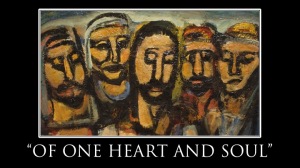 Do you ever read scripture and think: “Really?!” “Really?!” was my first reaction when I read this text. I thought, whoever wrote this first line of this passage must be the type of guy who writes greeting cards and inspirational posters filled with empty platitudes. No way could any group unequivocally say that they are of “one heart and soul.” Even one of the commentaries I read this week said, “there is little doubt that our author paints a rather idyllic scene.”[1] Indeed!
Do you ever read scripture and think: “Really?!” “Really?!” was my first reaction when I read this text. I thought, whoever wrote this first line of this passage must be the type of guy who writes greeting cards and inspirational posters filled with empty platitudes. No way could any group unequivocally say that they are of “one heart and soul.” Even one of the commentaries I read this week said, “there is little doubt that our author paints a rather idyllic scene.”[1] Indeed!
But then my second thought was jealousy. I’d love to live in a society that was that incredibly united and without any needs. A culture where “great grace [is] upon [us] all.” Could it be, might it be possible?
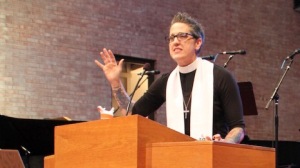 This reminds me of a sermon on the feeding of the 5,000 that I heard by Nadia Bolz-Weber, Pastor of “House for All Sinners and Saints,” a Lutheran church in Denver, CO. She speaks about the possibilities of what happened at that tremendous miracle, and the disciples’ perceived inadequacies.
This reminds me of a sermon on the feeding of the 5,000 that I heard by Nadia Bolz-Weber, Pastor of “House for All Sinners and Saints,” a Lutheran church in Denver, CO. She speaks about the possibilities of what happened at that tremendous miracle, and the disciples’ perceived inadequacies.
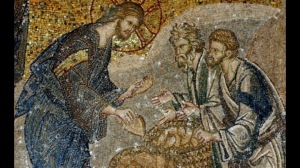 She writes, “I started to wonder what was going on with [the disciples] that they would see the scene in front of them as they did. I wondered why they wanted the crowds to go away and fend for themselves and why, when Jesus asked what they had, they said “nothing. Nothing but 5 loaves and a couple fish.”
She writes, “I started to wonder what was going on with [the disciples] that they would see the scene in front of them as they did. I wondered why they wanted the crowds to go away and fend for themselves and why, when Jesus asked what they had, they said “nothing. Nothing but 5 loaves and a couple fish.”
And with that offering, that meager offering, which they thought was “nothing,” a whole crowd was fed.
She continues saying, “the disciples must have learned… that there was more available to them than what they themselves were bringing to the table…Maybe [Jesus] didn’t want the disciples to send the people away because Jesus knew that those people had what the disciples lacked. Maybe the disciples, like us, need to be reminded that even when we do not have what is needed, what is needed is still at hand…it’s just [going to] come from God or others, because in God’s economy, that’s how it works.”
And then she preached this line that buzzes around in my head, and I plan to cross-stitch for my office wall one of these days:
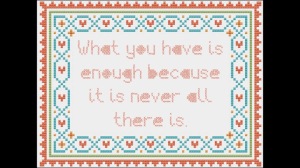 “What you have is enough because it’s never all that there is.”[2]
“What you have is enough because it’s never all that there is.”[2]
For me that has been a tremendously profound thought.
It also takes a lot of pressure off, refocusing what my life and ministry are about, not about being all things for all people, but pointing to our God who is, and our community, which can manifest God’s goodness for each of us.
By recognizing that we on our own are not enough, and allowing God to work through the places where we are lacking, we open ourselves to receiving grace. When we try to do it all on our own, we are operating as functional atheists, ones who see no need for God’s presence and providence in our lives. When we acknowledge that we are not self-sufficient, but still are willing to bring who we are and what we have, offering our lives as contributions to the work of God’s kingdom, all together we have more than enough.
 It is important to notice that our scripture says that the believers were all of one heart and soul… not that they were all of one mind or body. The believers in Acts experienced abundance not because they were all the same in their thoughts, physical appearance, and background, but because they were different. Through their individual experiences and gifts, they were able to contribute to a more complete community. Each bringing who they are and what they have, none of them experienced need.
It is important to notice that our scripture says that the believers were all of one heart and soul… not that they were all of one mind or body. The believers in Acts experienced abundance not because they were all the same in their thoughts, physical appearance, and background, but because they were different. Through their individual experiences and gifts, they were able to contribute to a more complete community. Each bringing who they are and what they have, none of them experienced need.
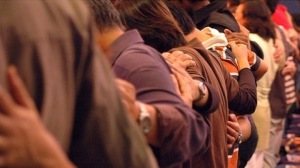 I would argue that one of the joys I’ve found in Christian community is that the less we have in common in body and mind, the more closely we rely on our common faith in Christ to be what unites us. Some of my most profound moments in ministry have been leading worship among a room of people with dementia, exploring what it is to be God’s beloved child with our X-team kids, or joining together with strangers from around the country to serve God in mission at workcamps during my high school summers. Those experiences are impactful because of our commonality found in Christ.
I would argue that one of the joys I’ve found in Christian community is that the less we have in common in body and mind, the more closely we rely on our common faith in Christ to be what unites us. Some of my most profound moments in ministry have been leading worship among a room of people with dementia, exploring what it is to be God’s beloved child with our X-team kids, or joining together with strangers from around the country to serve God in mission at workcamps during my high school summers. Those experiences are impactful because of our commonality found in Christ.
 If we decide to spend all of our time together because we’re all the same age, ethnicity, or gender, or because we like that same movies, music, and sports teams, our unification is not one of any depth or substance. But if we come together for worship and service to our God, because of our love of God and our belief in our resurrected Christ, we are indeed of one heart and soul, and privy to God’s abundance in our community and lives.
If we decide to spend all of our time together because we’re all the same age, ethnicity, or gender, or because we like that same movies, music, and sports teams, our unification is not one of any depth or substance. But if we come together for worship and service to our God, because of our love of God and our belief in our resurrected Christ, we are indeed of one heart and soul, and privy to God’s abundance in our community and lives.
“What you have is enough because it is never all there is.”
The uniqueness of that community in Acts, is that they understood that. They understood that on their own there was still need; by their own merits there was still sin. The reason they were united wasn’t some common pact to live in harmony or because they liked all the same things. It was because they knew and believed utterly that Jesus was lived and died so that they may have new life, and that they might know a way forward into God’s grace.
 In our passage today we read, “with great power the apostles gave their testimony to the resurrection of the Lord Jesus, and great grace was upon them all.” That great grace was not upon them because of their own merits, but because of the deference that showed to God, the way that they used their lives to point to the resurrection of Jesus Christ. This is what united them and gave them purpose as they were forming the new church follow Christ’s death and resurrection.
In our passage today we read, “with great power the apostles gave their testimony to the resurrection of the Lord Jesus, and great grace was upon them all.” That great grace was not upon them because of their own merits, but because of the deference that showed to God, the way that they used their lives to point to the resurrection of Jesus Christ. This is what united them and gave them purpose as they were forming the new church follow Christ’s death and resurrection.
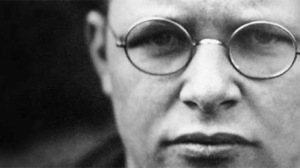 Twentieth century theologian, Dietrich Bonheoffer wrote, “Our community with one another consists solely in what Christ has done to both of us. This is true not merely at the beginning, as though in the course of time something else were to be added to our community; it remains so for all the future and to all eternity. I have community with others and I shall continue to have it only through Jesus Christ. The more genuine and the deeper our community becomes, the more will everything else between us recede, the more clearly and purely will Jesus Christ and his work become the one and only thing that is vital between us. We have one another only through Christ, but through Christ we do have one another, wholly, for eternity.”[3]
Twentieth century theologian, Dietrich Bonheoffer wrote, “Our community with one another consists solely in what Christ has done to both of us. This is true not merely at the beginning, as though in the course of time something else were to be added to our community; it remains so for all the future and to all eternity. I have community with others and I shall continue to have it only through Jesus Christ. The more genuine and the deeper our community becomes, the more will everything else between us recede, the more clearly and purely will Jesus Christ and his work become the one and only thing that is vital between us. We have one another only through Christ, but through Christ we do have one another, wholly, for eternity.”[3]
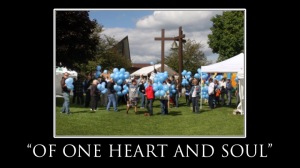 Might our community be “of one heart and soul”? As idyllic as it sounds, and as incredible as it may be to believe, this unity is possibly through our common belief in our resurrected Christ. May it be so. Amen.
Might our community be “of one heart and soul”? As idyllic as it sounds, and as incredible as it may be to believe, this unity is possibly through our common belief in our resurrected Christ. May it be so. Amen.
[1] David L. and Taylor, Barbara Brown Bartlett, Feasting On the Word: Year B, Volume 2, Lent through Eastertide: Preaching the Revised Common Lectionary (Feasting On the Word: Year b Volume) Louisville, KY: Westminster John Knox Press, 2011), 382.
[2] Nadia Bolz-Weber “Sermon On Lembas Bread, the Feeding of the 5,000 and Why I Hated Pastoral Care Classes,” http://www.patheos.com/blogs/nadiabolzweber/, August 6, 2014, accessed April 9, 2015, http://www.patheos.com/blogs/nadiabolzweber/2014/08/sermon-on-lembas-bread-the-feeding-of-the-5000-and-why-i-hated-pastoral-care-classes/.
[3] Dietrich Bonhoeffer, Life Together, trans. John W. Doberstein (San Francisco: HarperSanFrancisco, ©1954).